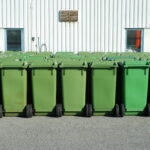Many in business are familiar with the phrase, “you can’t manage what you can’t measure.” After observing restaurants struggling to monitor their wasted food and reasons for product loss, Phood created a new tool to help businesses track and improve food inventory management. According to Green Biz, Phood has drawn on artificial intelligence technology to…
On November 10, RecyclingWorks in Massachusetts (RecyclingWorks) hosted the Fall 2020 WasteWise Forum Webinar in collaboration with the Massachusetts Department of Environmental Protection (MassDEP) and the U.S. Environmental Protection Agency (EPA). This year’s fall forum focused on strategies for businesses and institutions that help maximize food waste diversion, with presentations from the Massachusetts College of…
The Massachusetts Department of Environmental Protection (MassDEP) recently released proposed amendments to the solid waste disposal bans (310 CMR 19.000). These changes would add mattresses and textiles as materials that are banned from disposal in Massachusetts, and lower the threshold for the commercial organics ban so that it would apply to businesses generating one-half ton…
During a time when the foodservice industry is experiencing thinner margins and altered operations, reducing food waste can support businesses as they adjust. According to a The Business Case for Reducing Food Loss and Waste: Restaurants, each dollar invested in solutions for kitchen food waste can result in an average of a seven dollar return…
The Massachusetts Department of Agricultural Resources (MDAR), in collaboration with the Division of Marine Fisheries (DMF), recently launched the MassGrown Exchange, a new online platform that facilitates business-to-business connections within the local food system. This platform is a tool for businesses looking to sell, donate, or purchase Massachusetts crops, seafood, products and services: Buyers (including…
Has your business ever lost food inventory as result of an emergency or other unplanned event? Once an emergency happens, it is likely too late to create a plan that prevents wasted food from being disposed of as trash. With a plan in place in advance, you can reduce the amount of food that is…
Wellspring Harvest is a 15,000 square foot hydroponic greenhouse in Springfield, developed by the Wellspring Cooperative Corporation. The greenhouse produces over 200,000 plants per year (including lettuce, greens, and herbs), which are distributed to local grocery stores, healthcare centers, and colleges & universities. Wellspring connected with RecyclingWorks in Massachusetts (RecyclingWorks) for assistance initiating an organic…
As restaurants and other food-service operations adapt to a new normal, the associated changes in procurement practices, customer base, and hours of operation can lead to increased levels of food waste. RecyclingWorks in Massachusetts (RecyclingWorks) recently spoke with PAGU, a restaurant in Cambridge, to learn more about how they reduce food waste throughout their operations…
In Fall 2019, the Massachusetts Department of Environmental Protection (MassDEP) released the Draft 2020-2030 Solid Waste Master Plan for public comment. The plan proposes aggressive goals for waste reduction, building on the 18 percent reduction in disposal per capita achieved from 2008 to 2018. This includes targeted reuse and recycling efforts for textiles, mattresses, and…
Belly of the Beast is a fast-casual restaurant in Northampton focused on using local ingredients and engaging in sustainable practices. Although operations were disrupted due to COVID-19, Belly of the Beast has been able to maintain a focus on waste reduction while strengthening ties to the local community and feeding those in need. Recently, Belly…

